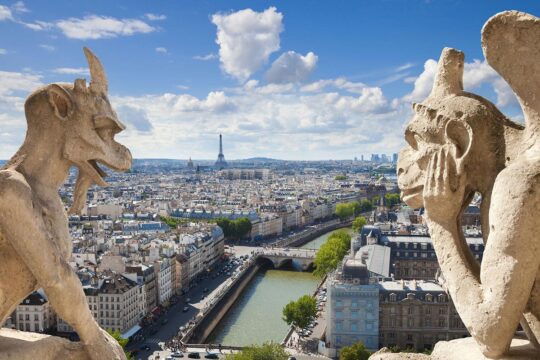French President Emmanuel Macron on Sunday marked 75 years since the roundup of 13,000 Jews to be sent to Nazi death camps, calling France's responsibility a "stark truth" at a ceremony attended by Israeli Prime Minister Benjamin Netanyahu.
Speaking near the former site of the Velodrome d'Hiver, the indoor cycle track from which the Jews were deported in 1942, Macron said: "It is indeed France that organised" the roundup. "Not a single German" took part.
Netanyahu's presence at the ceremony sparked controversy, with the Union of French Jews for Peace (UJFP) calling the invitation "shocking" and "unacceptable".
The UJFP accused the Israeli government of "usurping the memory of the victims of Nazism to make people believe that Israel represents all the world's Jews".
The ceremony recalled the day when officials of the Vichy regime in Nazi-occupied France began rounding up 13,152 Jews and taking them to the Velodrome d'Hiver, an indoor cycle track in Paris.
Fewer than 100 of those who were detained at the so-called Vel d'Hiv and then sent to the Nazi death camps survived.
Macron was the fourth French president to accept blame for France's role in the deportations -- which totalled more than 75,000 -- since Jacques Chirac first did so in 1995.
"Time does its work," Macron said. "Archives open (and) the truth comes out. It's stark, irrevocable. It imposes itself on us all," Macron said of one of the darkest chapters in France's wartime history.
In a clear reference to far-right leader Marine Le Pen, the rival he defeated in May, Macron denounced "politicians who are prepared to reverse the truth".
Le Pen had insisted during the campaign that today's France could not be accountable for the Vichy regime's actions.
- 'Special heroism' -
Netanyahu hailed the "special heroism" of the French resistance to the Nazis, praising the "noble French citizens who at great risk to their own lives" saved thousands more Jews from perishing in the death camps where at least six million would die overall between 1941 and 1945.
"For the sacred honour of those who perished... let us remember the past, let us secure tomorrow," he said.
"The strength of Israel is that it is the one certain guarantee that the Jewish people will never undergo a Holocaust again."
Among other critics of Netanyahu's presence was former Israeli ambassador to France, Elie Barnavi, who told AFP it made him "a little uneasy".
Barnavi, now a Peace Now activist advocating a two-state solution to end the Middle East conflict, added: "This story has nothing to do with Israel."
Netanyahu, the first Israeli prime minister to attend a Vel d'Hiv commemoration, said the invitation was a "very, very strong gesture" that underscored the longstanding friendship between France and Israel.
- Yellow badges -
Macron addressed Netanyahu as "dear Bibi" and called "anti-Zionism" a new form of anti-Semitism.
Among Sunday's other speakers were prominent French Nazi hunter Serge Klarsfeld and Pierre-Francois Veil, son of Holocaust survivor and rights icon Simone Veil, who died late last month aged 89.
Several members of the group Sons and Daughters of the Deported Jews of France attended, wearing yellow badges recalling the yellow stars that Jews were forced to wear on their lapels during the occupation.
Netanyahu's visit is the first since he joined a massive march attended by numerous world leaders in solidarity with the victims of the January 2015 terror attacks on the Charlie Hebdo satirical magazine and a Jewish supermarket.
He was to hold talks later Sunday with Macron, their first official meeting.
Macron met Palestinian leader Mahmud Abbas on Wednesday, when he reiterated both France's support for a two-state solution and its opposition to Israel's building of settlements in occupied Palestinian territory.
Macron's predecessor Francois Hollande's efforts to mobilise the international community on the issue angered Israel.
Netanyahu arrived after a surge of violence in Jerusalem, where a gun attack by three Arab Israelis in the Old City Friday left two Israeli police officers and the attackers dead.
Talks between Israel and the Palestinians have been at a standstill since the failure of US mediation in the spring of 2014.
The two leaders are also expected to discuss Israel's arch-foe Iran, in particular Tehran's role in the Syrian conflict, where it is backing President Bashar al-Assad.



